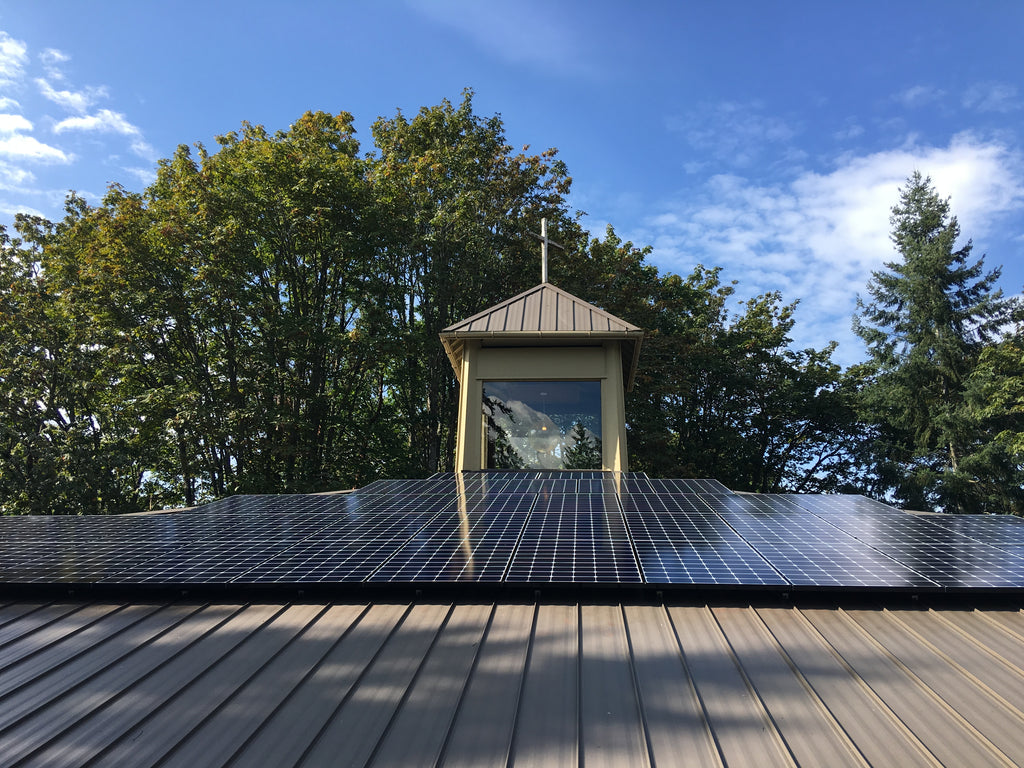Mercer Island United Church of Christ Goes Solar. Learn How it Worked Out!

The following is an interview with Roberta Rominger, the Pastor at Mercer Island United Church of Christ, around going solar and their communities involvement on climate and sustainability issues.
What prompted the Mercer Island church going solar?
Climate has always been THE issue for me, but I wasn’t sure how to get it on the church’s agenda. But then we had a visit from Jim Antal, the environmental consultant from our United Church of Christ leadership. Do you remember the winter before last – the huge snows we had? Antal came to speak in Seattle the night after one of the big snowstorms. There weren’t very many people in the audience. I wasn’t sure we were going to get there! But I went with a few people from my congregation, and he totally convinced them, not only that climate change was immediate and urgent, but that the church could contribute to the response in a way nobody else could. I remember his exact words: people need a place where it is safe to know what they know and feel what they feel, and the church can be that. As soon as we got home, we started a book group to read Jim Antal’s book (Climate Church, Climate World). Then I preached several sermons about it. We were also hosting a community group, “Solarize Mercer Island.” It all came together and we decided we should go solar as a church. It was completely unanimous. The only discussion we had was whether to go for it right away or wait for the next generation of technology. The church voted to move on it right away.
How did going solar inspire you spiritually, particularly on the topic of climate change?
I feel inspired every time I see the panels gleaming on the roof! But I guess this is what I’d say. There are two things that make it possible to survive spiritually when you know what’s happening to our planet. One is community. I don’t think anybody lasts very long trying to do environmental work alone. We totally need each other. The other thing is getting out and doing something, preferably something big, that you know will make a difference. The decision about going solar energized our congregation and brought us all closer together. It was something big that we could do. We also connected with a couple of other churches that had installed solar ahead of us. We got people from their congregations to come and talk about how they made the decision and what the experience was like. I loved the feeling of reaching out for support – that’s a spiritual experience too.
What were the topics of the sermons?
The sermons were not lectures about climate change. I figured that everybody already had as much information as they could cope with. I wanted to deal with the feelings involved. This is important. I guess I’ve been upset about species extinctions and the ocean and melting glaciers and everything for as long as I can remember. But at some point, I realized that the feelings were bigger than just me. The grief I feel, and the outrage and frustration and most of all the love, I believe that I am feeling what God feels. That probably sounds pretentious, but it’s very real to me. When I get involved in climate work, I feel like it’s God working through me. But that isn’t what you asked! My sermons were called “Seizing Hope,” and I talked about our gut-level responses to what we know is coming and what spiritual resources our faith offers for giving us strength. There were six sermons, one on isolation, one on denial, then anger, fear, grief, and powerlessness. I really dug deep for messages that would connect us with the strength God is holding out to us. I remember Kristy Royce really helped me with the one on fear! It was more than just sermons – there are some amazing songs out there. One Sunday somebody sang “Bridge over troubled waters” – there wasn’t a dry eye!
What were the congregation's reactions to these sermons on climate change?
A couple of people couldn’t handle them. One person left the church – I think she’d been looking for a reason to move on. But other people came, including people from the community who heard about it through Solarize Mercer Island. There was a real buzz. I have to say that if I were doing it over again, six weeks was too long. But I’m glad we gave time to all those feelings. Since then, I think people have felt that this was a topic it was okay to talk about in the face of really gut-wrenching emotions. It still takes some courage to get past the denial we all retreat to.
What role do you think churches play on a community-wide level when it comes to climate change action?
Great question! There are so many things! Before I came as pastor, the church was already hosting annual e-cycling events, so we were already on the map. Then we started looking for the people on the Island who were doing climate work and getting to know them. It was me to start with. Our city has a sustainability officer, and he put out an invitation for anybody who was interested to meet at City Hall on a certain evening. I went, and I kept going. I met the key players, and when we started working on issues, I was in there. First there was a campaign to get the City Council to adopt sustainability as its framework for strategic planning. The came I-1631, the fantastic climate bill. Our church collected signatures to help get it on the ballot – that was 2018. A bunch of us have gone to the climate marches in Seattle. Before every march, we have sign-making at our church for the whole community, and people come. We hosted some sign-waving on Mercer Island this time last year – it feels like so long ago! I joined Fridays for Future too – it gave me a chance to take my sign to Seattle every Friday lunchtime. What else? We thought about having a street fair this year for the 50th anniversary of Earth Day. That didn’t happen because of Covid. But we were starting to work together with the climate action group in the local Rotary club. I feel really strongly about this, that we should look for chances to be in partnership with other organizations. We need each other. And it gives people a chance to see the church in a new light. Did I say that there was a story about us in the Mercer Island Reporter? We were on the front page – the congregation loved it. And we’ve got this reader board outside our church, right on a main street, and we put climate messages on there pretty regularly. And when our solar panels were finally up, we had a party and invited the community and got the mayor to speak. You just have to look for ways of being part of the action. People welcome it.
How much interest in going solar for their private homes did the church going solar generate?
I’m aware of three families who have gone solar. There’s another couple who would love to do it, but their house is completely in the shade. If there were an opportunity for community solar, they’d be first in line.
What advice would you have for other places of worship around going solar?
Go for it if you possibly can! It brings people together around a cause we’re all passionate about, and it does make a difference to the environment, however modest. Plus, every time people drive past the church, the panels shout what we believe in.



